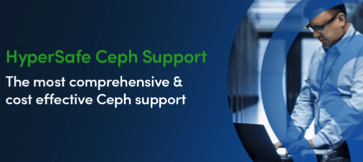SoftIron HyperSafe Enterprise Ceph Support Services
Service offerings tailored to their particular storage infrastructure needs at competitive pricing.
This is a Press Release edited by StorageNewsletter.com on April 1, 2021 at 2:33 pm
- SoftIron Ceph Support Takeover – Resuming services from a previously existing support vendor.
- SoftIron HyperDrive Migration – Assisting in the migration from a legacy Ceph installation to SoftIron’s HyperDrive appliances.
- Emergency Assistance – Providing as-needed support for enterprises requiring experienced and capable Ceph engineers.
- Transition to SoftIron Linux – Utilization of the only Linux distribution in the world tuned for Ceph performance.
Comments
Almost at the same time, we see SoftIron announcing its HyperSafe support services and SUSE choosing to quit Ceph. The SUSE decision is not official yet, SES is still listed on the website but partners started to receive the news about the transition last December. In details, it appears that the support continues of course, this is the minimum when you have deployed customers, but new licences can't be purchased.
On the SoftIron side, we understand that the company wishes to capitalize on its deep Ceph expertise and various deployments in demanding environments for specific workloads.
For SUSE, the story is different, even if Ceph is open source, it is implicitly associated with Red Hat due to the acquisition of Inktank, Sage Weil is still there with many others. So the German company suffered of this image not having a direct product and recognizes its difficulties to penetrate data centers with its SUSE "flavor" of Ceph.
In fact, the reason seems to be based on its Rancher Labs acquisition and the desire for SUSE to address container-based workloads and environments.
Read also:
SUSE no longer supports Ceph - WTF?













 Subscribe to our free daily newsletter
Subscribe to our free daily newsletter

